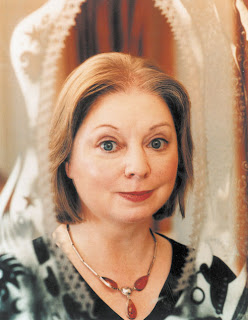Victoria here, still breathless after finishing Hilary Mantel’s novel Wolf Hall. I admit I had a hard time getting into the novel at first, but soon I was hooked and hung on every word to the finish. I can understand why Wolf Hall won the Man Booker Prize. It is exceptionaly well written and seems firmly based in fact.
 The novel is set in the time of Henry VIII and the main character is Thomas Cromwell, a man of humble birth who is rising to prominence as an adviser to the king after serving Cardinal Wolsey. Cromwell (later named Earl of Essex, as in the picture at left from the National Portrait Gallery in London, after a painting by Hans Holbein) is brilliant at accomplishing any task, large or small, for the king and the court. He is a skilled negotiator, creative in suggesting solutions to complicated problems and efficiently acquires power and influence.
The novel is set in the time of Henry VIII and the main character is Thomas Cromwell, a man of humble birth who is rising to prominence as an adviser to the king after serving Cardinal Wolsey. Cromwell (later named Earl of Essex, as in the picture at left from the National Portrait Gallery in London, after a painting by Hans Holbein) is brilliant at accomplishing any task, large or small, for the king and the court. He is a skilled negotiator, creative in suggesting solutions to complicated problems and efficiently acquires power and influence. The stories of Henry VIII, his wives and mistresses, his reign and those of his short-lived son and his two daughters have been popular in all sorts of media in the past few years. Novels about ill-fated queens, from Katherine of Aragon to Mary, Queen of Scots, have been seen on television and the big screen. I frankly wondered if I needed one more version of a Tudor story when I began Wolf Hall. Though I thought Jonathan Rhys-Meyers made an interesting young Henry, despite the wrong build and wrong shade of hair, I thought it was ridiculous by the end of The Tudors. Wait — it was good drama but bad casting and veered from historical to completely faux by the end of the fourth and last season. In my opinion, of course.
The stories of Henry VIII, his wives and mistresses, his reign and those of his short-lived son and his two daughters have been popular in all sorts of media in the past few years. Novels about ill-fated queens, from Katherine of Aragon to Mary, Queen of Scots, have been seen on television and the big screen. I frankly wondered if I needed one more version of a Tudor story when I began Wolf Hall. Though I thought Jonathan Rhys-Meyers made an interesting young Henry, despite the wrong build and wrong shade of hair, I thought it was ridiculous by the end of The Tudors. Wait — it was good drama but bad casting and veered from historical to completely faux by the end of the fourth and last season. In my opinion, of course. But I digress. This time of the English Renaissance is not really MY period at all, but I must say Ms. Mantel’s skill gave me a new appreciation for the politics and scheming associated with Henry’s break with Rome, the Dissolution of the Abbeys, and the establishment of a new church (left, Tintern Abbey by Turner). The time of Henry VIII, Wolsey, Cromwell, More, and the Boleyns was a dreadful time of intrigue and bloody torture as well as a flowering of art and music.
But I digress. This time of the English Renaissance is not really MY period at all, but I must say Ms. Mantel’s skill gave me a new appreciation for the politics and scheming associated with Henry’s break with Rome, the Dissolution of the Abbeys, and the establishment of a new church (left, Tintern Abbey by Turner). The time of Henry VIII, Wolsey, Cromwell, More, and the Boleyns was a dreadful time of intrigue and bloody torture as well as a flowering of art and music. Hilary Mantel was born in Derbyshire in 1952. She has written many novels, for which she has won awards, culminating in the 2009 Man Booker Prize, probably the world’s most prestigious. She also writes essays, reviews and has written a memoir as well as many short stories. She is working on a sequel to Wolf Hall tentatively titled The Mirror and the Light. I am eager to read it. In the meantime, the trade paperback has been recently released in the U.S. from Picador, an imprint of Macmillan.
Hilary Mantel was born in Derbyshire in 1952. She has written many novels, for which she has won awards, culminating in the 2009 Man Booker Prize, probably the world’s most prestigious. She also writes essays, reviews and has written a memoir as well as many short stories. She is working on a sequel to Wolf Hall tentatively titled The Mirror and the Light. I am eager to read it. In the meantime, the trade paperback has been recently released in the U.S. from Picador, an imprint of Macmillan.
Okay, I can see now that I finally have to break down and read these book. I am actually a fan of this period of English history, after the Regency of course, and the Tudor family is right up my alley. I have heard varying opinions on the book, but I will definitely add it to my towering TBR stack.
I started this — bought it in paperback in London in May — then put it aside! Mantel has a strange prose style — I've read some of her other novels — takes some getting used to! But I will get to it 🙂
I hated Jonathan Rhys-Meyers as King Henry VIII. The best Henry I've ever seen, believe it or not, was Ray Winstone!